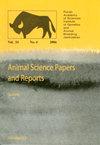饲粮中添加左旋肉碱和脂肪对肉鸡生产性能、胴体性状和血液成分的影响
IF 1.1
4区 农林科学
Q3 AGRICULTURE, DAIRY & ANIMAL SCIENCE
引用次数: 0
摘要
传统上,家禽业选择动物是为了提高生产性能,而不考虑对脂肪沉积的影响。饲粮中左旋肉碱可改变脂质代谢;然而,当与脂肪结合使用时,效果并不明显。本试验旨在研究饲粮中不同水平左旋肉碱(0、200和400 mg/kg)和脂肪(0、2.5和5%)对商品肉鸡生长性能和屠宰性状的影响。n = 270)。各组的饲粮处理为:1)0 mg/kg左旋肉碱+ 0%脂肪,2)200 mg/kg左旋肉碱+ 0%脂肪,3)400 mg/kg左旋肉碱+ 0%脂肪,4)0 mg/kg左旋肉碱+ 2.5%脂肪,5)200 mg/kg左旋肉碱+ 2.5%脂肪,6)400 mg/kg左旋肉碱+ 2.5%脂肪,7)0 mg/kg左旋肉碱+ 5.0%脂肪,8)200 mg/kg左旋肉碱+ 5.0%脂肪,9)400 mg/kg左旋肉碱+ 5.0%脂肪。测定并分析了饲料系数、生长性能、血液生化指标、胴体性状和体成分。饲粮中添加左旋肉碱对欧洲生产效率系数、翅重、肠长和肠重、脾脏和肝脏重、全腹胴体和腹部脂肪重以及血清甘油三酯水平均有显著影响。饲粮中添加左旋肉碱可提高肉仔鸡的生长性能,因此它可能是减少肉仔鸡脂肪储存和提高供人食用的胴体质量的一个有希望的解决方案。本文章由计算机程序翻译,如有差异,请以英文原文为准。
The effect of dietary L-carnitine and fat on performance, carcass traits and blood components in broiler chickens
Abstract The poultry industry has traditionally been selecting animals for improved performance without consideration for the effect on fat deposition. Dietary L-carnitine can alter lipid metabolism; nevertheless, when combined with fat, the effects are not clear. This study shows the effect of different dietary levels of L-carnitine (0, 200 and 400 mg/kg) and fat (0, 2.5 and 5%) on growth performance and slaughter traits of commercial broilers (Ross 308; n=270). The groups received the following dietary treatments: 1) 0 mg/kg L-carnitine + 0% fat, 2) 200 mg/kg L-carnitine + 0% fat, 3) 400 mg/kg L-carnitine + 0% fat, 4) 0 mg/kg L-carnitine + 2.5% fat, 5) 200 mg/kg L-carnitine + 2.5% fat, 6) 400 mg/kg L-carnitine + 2.5% fat, 7) 0 mg/kg L-carnitine + 5.0% fat, 8) 200 mg/kg L-carnitine + 5.0% fat, and 9) 400 mg/kg L-carnitine + 5.0% fat. Feed conversion ratio, growth performance, blood biochemical parameters, carcass traits and body composition were measured and analyzed. Levels of fat with L-carnitine had significant effects on the European Performance Efficiency Factor, wings weight, intestine length and weight, spleen and liver weight, full abdomen carcass and abdominal fat weight, as well as serum triglyceride levels. Dietary L-carnitine supplementation improved growth performance of broilers, thus it may be a promising solution to reduce fat storage in broilers and improve the quality of carcasses intended for human consumption.
求助全文
通过发布文献求助,成功后即可免费获取论文全文。
去求助
来源期刊

Animal Science Papers and Reports
生物-奶制品与动物科学
CiteScore
1.60
自引率
40.00%
发文量
0
审稿时长
>12 weeks
期刊介绍:
ANIMAL SCIENCE PAPERS AND REPORTS (Anim. Sci. Pap. Rep.) is an English language quarterly published by the Institute of Genetics and Animal Breeding of the Polish Academy of Sciences, Jastrzębiec. Papers are welcome reporting studies in all aspects of animal breeding and genetics, reproduction, animal biotechnology, physiology, ethology and welfare. Critical review papers and short reports will also be considered and in justified cases also other original articles dealing with animal science and production.
 求助内容:
求助内容: 应助结果提醒方式:
应助结果提醒方式:


